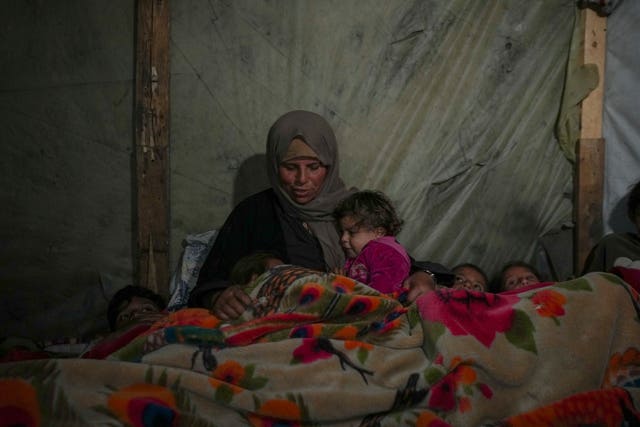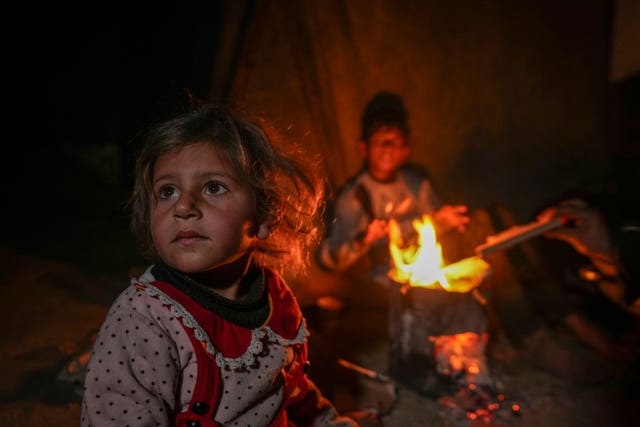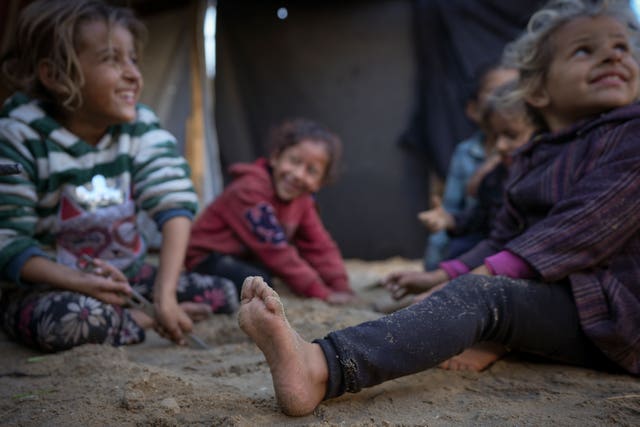Displaced Palestinians enduring winter with little protection from cold
Many of the nearly two million people displaced by the war with Israel have poor shelter, limited food and only summer clothing.

Winter is hitting the Gaza Strip and many of the nearly two million Palestinians displaced by the devastating 14-month war with Israel are struggling to protect themselves from the wind, cold and rain.
There is a shortage of blankets and warm clothing, little wood for fires, and the tents and patched-together tarps families are living in have grown increasingly threadbare after months of heavy use, according to aid workers and residents.
Shadia Aiyada, who was displaced from the southern city of Rafah to the coastal area of Muwasi, has only one blanket and a hot water bottle to keep her eight children from shivering inside their fragile tent.
“We get scared every time we learn from the weather forecast that rainy and windy days are coming up because our tents are lifted with the wind,” she said. “We fear that strong windy weather would knock out our tents one day while we’re inside.”

When they fled their home, her children only had their summer clothes, she said. They have been forced to borrow some from relatives and friends to keep warm.
The United Nations warns of people living in precarious makeshift shelters that might not survive the winter.
It has said at least 945,000 people need winter supplies, which have become prohibitively expensive in Gaza. The UN also fears infectious disease, which spiked last winter, will climb again amid rising malnutrition.
The UN Agency for Palestinian Refugees, known as UNRWA, has been planning all year for winter in Gaza, but the aid it is able to get into the territory is “not even close to being enough”, said Louise Wateridge, an agency spokeswoman.

About 22,000 tents have been stuck in Jordan and 600,000 blankets and 33 truckloads of mattresses have been sitting in Egypt since the summer because the agency does not have Israeli approval or a safe route to bring them into Gaza, and because it had to prioritise desperately needed food aid, Ms Wateridge said.
Many of the mattresses and blankets have since been looted or destroyed by the weather and rodents, she added.
The International Rescue Committee is struggling to bring in children’s winter clothing because there “are a lot of approvals to get from relevant authorities”, said Dionne Wong, the organisation’s deputy director of programmes for the occupied Palestinian territories.
“The ability for Palestinians to prepare for winter is essentially very limited,” she said.
The Israeli government agency responsible for co-ordinating aid shipments into Gaza said in a statement that Israel has worked for months with international organisations to prepare Gaza for the winter, including facilitating the shipment of heaters, warm clothing, tents and blankets into the territory.

“Rats walk on us at night because we don’t have doors and tents are torn,” she said. “The blankets don’t keep us warm. We feel frost coming out from the ground. We wake up freezing in the morning.
“I’m scared of waking up one day to find one of the children frozen to death.”
On Thursday night, she fought through knee pain exacerbated by cold weather to fry zucchini over a fire made of paper and cardboard scraps outside their tent. She hoped the small meal would warm the children before bed.
Omar Shabet, who is displaced from Gaza City and staying with his three children, feared lighting a fire outside his tent would make his family a target for Israeli warplanes.
“We go inside our tents after sunset and don’t go out because it is very cold and it gets colder by midnight,” he said.
“My seven-year-old daughter almost cries at night because of how cold she is.”





